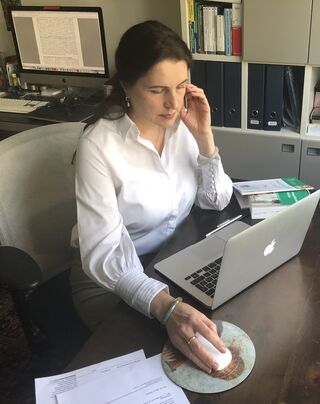Loneliness
The Felt Passage of Time During the Pandemic
A satisfactory social situation during the pandemic prevents boredom.
Posted November 6, 2020
After a few weeks of social isolation during the COVID-19 pandemic, people reported a remarkable change in subjective time. Newspapers and blogs around the world quickly responded and reported that time had passed “oddly quickly” during social isolation caused by the lockdown. Researchers in several countries quickly initiated online studies to capture these subjective distortions.
Three recently-published studies conducted in Italy, the UK, and France on the perception of time during the times of the most strictly controlled lockdown (between March and May 2020) have been published so far. Why is time perception as a measure so important? Subjective time is an indicator of the level of well-being or distress of an individual.
In the study conducted in Italy by Nicola Cellini and colleagues from the University of Padova, many participants reported that they had had more difficulty keeping track of time. They were often confused about what day of the week or time of the day it was. People also reported an expansion of time together with a sense of boredom. The study from France by Sylvie Droit-Volet and coworkers from the University Clermont Auvergne came to a very similar conclusion in that people mainly complained about a slowing down of time at the present moment while experiencing the lockdown due to an increase in boredom.
In both studies, the feeling of "stretched" time was more pronounced in individuals who had poorer sleep quality, another indication of distress. In contrast, the study conducted by Ruth Ogden from Liverpool John Moores University in the UK inquired how quickly the previous day and week seemed to have passed compared to the time before lockdown. Only 19 percent and 13 percent reported that time had passed as usual. An equal number of participants indicated that the previous day had passed more slowly (40 percent) or more quickly (41 percent). Referring to the previous week, 39 percent of the participants reported that time had seemed to pass more slowly, and 48 percent responded that it had seemed to pass more quickly.
What caused individuals to experience time as slowing down or speeding up? Individuals reported a relative slowing down when they experienced increased boredom, less satisfaction with their social situation, and reduced occupation. Boredom in the French study was the strongest predictor of the feeling that time passed slowly. The UK study particularly showed that people who experienced less stress, greater satisfaction with their social situations, and higher task loads felt the day to pass more quickly. Satisfaction with the social situation therefore was predictive of how people felt time had passed during the preceding week.
Interestingly, these studies differ from the unanimous consensus found in the media, which claimed that time passed more quickly during the lockdown. Most likely, journalists who still had meaningful tasks at hand (writing an article) asked people with meaningful occupations in home offices what they felt. The research studies show that individual differences in how people were occupied and reacted to the situation determined the subjective passage of time.
How can these findings be interpreted? Regarding a felt slower passage of time, people who are more stressed in daily life or feel bored attend more to time. This results in a feeling that time passes more slowly at a given present moment. For a more elaborate view, read my previous Psychology Today blog post on the relation between boredom and subjective time. With fewer meaningful thoughts and tasks to do, a person’s capacity to distract from attending to time deteriorates and time drags awfully slowly.
Regarding the felt faster passage of time, routines create the impression that time goes by quickly because fewer novel and exciting experiences are stored in memory and later retrieved. For this relation between autobiographical memory and time, see my previous Psychology Today blog post. This was the experience for all of those who considered themselves to be in a relatively satisfying social situation and had something to do. These activities in a relatively pleasant social environment, maybe even repetitious, created the impression of time passing quickly. Sundays and Mondays were no longer filled with different experiences, e.g. a barbeque with family and friends on Sunday and demanding business meetings on Monday. Looking back, days merge into one and another and are indistinguishable. What day is it today? One has lost track of time.
Whereas solitude is the chosen state of being alone, loneliness is experienced as stressful. Loneliness has detrimental effects on wellbeing, in the long run increasing the risk of becoming mentally and physically ill. Since humans are evolutionarily predisposed to be part of an interacting community, it is not farfetched to claim that some mental and physical disorders can be traced back to the increasing isolation in our individualized societies at any time. Since social isolation was intensified during the pandemic, many more people will have been in situations of loneliness – with detrimental effects on well-being.

How to cope with social isolation and 'empty time' during the pandemic? In order to emotionally self-regulate and to more or less be able to cope with the pandemic, we need meaningful projects and goals. I have written in my April 2020 Psychology Today blog post about the psychological consequences of the pandemic and what to do about it. The summary is: When you have a future-oriented goal and you organize your life in little steps of activity on which you concentrate — away from your worrying self and time.
References
Cellini, N., Canale, N., Mioni, G., Costa, S. (2020). Changes in sleep pattern, sense of time and digital media use during COVID‐19 lockdown in Italy. Journal of Sleep Research: e13074.
Droit-Volet, S., Gil, S., Martinelli, N., Andant, N., Clinchamps, M., Parreira, L., ... & Dutheil, F. (2020). Time and Covid-19 stress in the lockdown situation: Time free,«Dying» of boredom and sadness. PloS One, 15(8), e0236465.
Ogden, R. (2020). The passage of time during the UK Covid-19 lockdown. PLOS ONE 15(7), e0235871
Wittmann M. (2020). Subjective passage of time during the pandemic: routine, boredom, and memory. KronoScope 20, 260-271.




